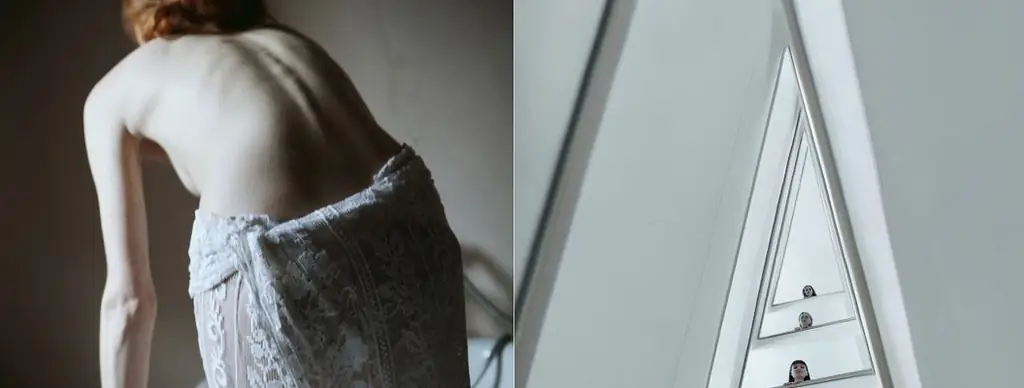- Author Adrian Jeff jeff@psychologosportal.com.
- Public 2023-12-17 05:06.
- Last modified 2025-01-24 14:09.

I do not want intimacy after the birth of a child. Why?
How to understand what has changed in me? Which doctor should I go to and should I go to medicine at all? Maybe leave everything as it is and wait for everything to work out by itself? What if the desire to share the bed of love with your spouse no longer appears? How to be?
What if the thought of an approaching romantic night is not at all happy? I hate the touch of my husband, the kisses. The desire for intimacy has simply disappeared. When did it happen? Almost immediately after the baby is born. Can it really be connected with the appearance of the baby? Is it a hormonal imbalance or some kind of physiological problem with a clever medical name that young moms have?
What is the reason?
To be honest, at first I correlated this with physical fatigue. After giving birth, life changed dramatically. A newborn baby requires constant care and attention. There are practically no breaks between feedings and diaper changes. I am on my feet all day: cooking, washing, going to the store or to the clinic. I am unrealistically tired and, of course, between the kisses of my husband and sleep, I will choose sleep.
However, even after a relatively good rest, I still find myself thinking that I still don't want a husband. My feelings for him have not disappeared - I am sure that I also love my spouse. But the physical attraction just disappeared.
How to understand what has changed in me? Which doctor should I go to and should I go to medicine at all? Maybe leave everything as it is and wait for everything to work out by itself? What if the desire to share the bed of love with your spouse no longer appears? How to be?
Let's try to understand this confusing issue with the help of systems thinking. System-vector psychology of Yuri Burlan gives an absolutely clear explanation of such a situation.
Hush, don't bother me thinking
From the point of view of system-vector psychology, each of us is born with a predetermined set of mental properties and desires, which are called vectors.
The owners of some vectors - urethral and anal - are naturally endowed with a strong libido. In contrast, there are vectors that are characterized by a lower physical attraction to the opposite sex, and in some cases, even its absence.
So, the bearer of the sound vector is distinguished by a particularly passive attitude to sex. This is a person endowed with abstract intelligence, for whom intangible desires, associated with cognition of the world, research activities, search for answers to their questions about meaning, are in the first place. The material world and all physical desires related to food, sleep and sex are secondary for the sound engineer.
From the name of the vector it is clear that a sound engineer is a person with a particularly subtle perception of sounds. His main work is concentration, work of thought, mind.
Experiencing an interest in understanding the intangible world, the owner of the sound vector realizes himself well in music, science, medicine, literature and linguistics. Any mental concentration brings him great pleasure. But noise and loud sounds become the biggest test for the sound engineer. It hurts! Noise outside interferes with concentration, causing the desire to hide in the saving silence, to isolate oneself from life.
Especially strongly react to sharp loud sounds are those sound people who, for one reason or another, do not fully realize their natural potential - the full power of their abstract intelligence - for solving specific problems. Such a sound engineer unconsciously seeks a place of solitude. This explains his frequent desire to be alone, away from noisy people.

Now imagine when such a sonorous young mother gives birth to a child who cries and screams loudly and for a long time, announcing his desires to drink, eat, and sleep. Day after day, the constant cry of the baby is slowly driving a young mother crazy.
Without filling the sound vector, a person experiences a feeling of a bottomless emptiness inside that there is nothing to fill. Everything seems so unnecessary, so worthless. In such states, the libido, already lowered by the asexual sound vector, completely disappears in the sound woman. That is, the desire for life and for intimacy.
Often, young mothers with a sound vector notice a general state of apathy, that is, a lack of desire to do something and take care of themselves. All efforts are invested in caring for the baby, and every day it becomes more difficult. You have to force yourself to be with the child, in such a state it is impossible to enjoy motherhood.
In addition, in the absence of filling the sound vector, the maternal instinct may be dulled in a young mother, she may even hate her child, as a source of noise that does not allow her to focus on her thoughts and constantly demands something from her. If we go deeper into this problem, then it is necessary to mention the possible appearance of the so-called postpartum depression, which is still treated in psychiatric departments of hospitals without understanding the true causes.
I love it so much that it's not scary to die
There is another group of the fairer sex who may notice a significant decrease in sexual desire after the birth of a child - these are the owners of the visual vector. System-vector psychology of Yuri Burlan characterizes all representatives of the visual vector as highly emotional people, very sensual, amorous, capable of a deep feeling of love and compassion for their neighbor.
Before the birth of a child, such a woman is filled with love for her spouse, creating a strong emotional connection with him. Through this emotional connection, a woman receives from a man a sense of security and safety, which is especially necessary for a woman with a visual vector. As soon as the baby appears, she switches her attention to the small and defenseless creature. If at the same time she ceases to pay attention to her husband, if she cannot find time to talk about feelings, share what is meaningful to each other, then there is an emotional distance from her husband. Often, this is facilitated by the tension that arises in connection with new roles for men and women, the inability to adapt the changes taking place in their life together.
A visual woman can also feel this as a loss of attraction to her spouse, trying to find the causes in physiological problems. However, the true answers lie in her psyche, in the loss of an emotional connection with a man who is also often busy at work, seeking to financially provide for his family. As a result, the emotional component in the relationship is disturbed, and desires fade away.

At some moments, a visual woman may even have a feeling of anxiety, inexplicable fear. The fact is that in a person with a visual vector, the emotion of fear is innate - it goes away when a woman loves, and becomes aggravated when there is a weakening of the emotional connection with a man. Along with this, a woman loses a sense of safety and security. And the condition of the mother, in turn, is transmitted to the child. The child loses a sense of security and safety and becomes moody, cries a lot.
Where to look for help?
System-vector psychology of Yuri Burlan helps to understand the true causes of the problem. Why has the attitude towards your beloved changed, why you no longer want to communicate with people, why are you overcome by feelings of anxiety, fear, displeasure from life. Why motherhood doesn't fill with the all-consuming joy we've been waiting for.
After completing free online classes on system-vector psychology by Yuri Burlan, the desire to live, communicate, work and, of course, love returns. The spouse opens up for his other half on the other hand, complexes go away, quarrels disappear due to misunderstanding of each other. This brings new energy into any relationship, filling the two with a special feeling and desire for each other.
Possessing systemic thinking, any young mother will be able to get out of unpleasant states for her. A woman with a sound vector will gain amazing knowledge of focusing on other people, actively and joyfully joining life. The carrier of the visual vector will understand how to improve relationships with her beloved, again giving love and tenderness to her loved ones.
Thousands of people have already left their comments after listening to lectures on system-vector psychology by Yuri Burlan. Here is some of them:
“My relationship with my husband after the birth of the child became very tense. He went to bed and practically lived in another room, came in the evening, locked himself up, played on the computer at midnight and went to bed. Now I realized that initially our relationship was not built on real spiritual and emotional closeness, but rather on common interests. We were together, but each on his own, and each suffered on his own, although everything was given to us to understand each other.
During the training I began to deeply understand my husband, to understand what thoughts (and meanings) lie behind his words. I don't even need to answer anything, I just walk over and hug him."
Irina M., St. Petersburg Read full text of the result
“This creature, which should bring joy, blew my brain! I didn't know what to do with him. Why do I need him and why is he at all?.. Children's crying made me run away from the source of the cry, but in contrast to this there was an understanding that this should not be so. I wanted to get rid of the unbearable pain - a cry from outside and a cry from within!
After the training, all the contradictions that tormented me became clear, and this is no longer a problem, but a feature. No controversy. The feeling that the world can be cognized was not deceiving, and this tool of cognition was provided to us! Now it becomes clearer to me every day why all the same to live”.
Evgeniya B., Moscow Read the full text of the result
Want to experience the joy of motherhood and passion in a happy pairing relationship? Do not hesitate and register for free online classes in systemic vector psychology Yuri Burlana at the link.






